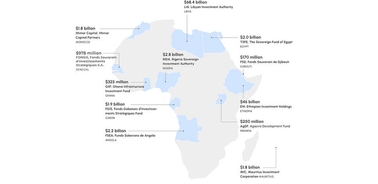- Home
- News And Events
- News
- Ie University’s 2025 Sovereign Impact Report Highlights Growing Role Of Sovereign Wealth Funds In Advancing The Un Sustainable Development Goals
IE University’s 2025 Sovereign Impact Report Highlights Growing Role of Sovereign Wealth Funds in Advancing the UN Sustainable Development Goals

The 2025 Sovereign Impact Report developed by the Center for the Governance of Change highlights how SWFs are increasingly directing capital toward sustainable development, particularly in Africa, to help close the $4.2 trillion annual SDG financing gap through long-term investment strategies.
Sovereign wealth funds (SWFs) are emerging as powerful actors in the global effort to achieve the United Nations Sustainable Development Goals (SDGs), according to the 2025 Sovereign Impact Report released today by IE University’s Center for the Governance of Change. Authored by Drew Johnson, Associate Director of Sovereign Wealth Research and the Sovereign Impact Initiative at IE University, the report confirms that SWFs are increasingly directing capital toward sustainable development, particularly in Africa, helping to close the $4.2 trillion annual SDG financing gap through targeted, long-term investment strategies.
With more than $13 trillion in assets under management globally, SWFs—many based in resource-rich developing countries—have emerged as powerful vehicles for sustainable capital deployment. Recent industry surveys suggest that 67% of SWFs now consider one or more of the UN Sustainable Development Goals (SDGs) in their investment decisions, a sharp rise from 48% in 2022. This growing alignment with the SDGs reflects a broader shift in the global financial landscape, where development impact is increasingly viewed as complementary to long-term financial returns.
Renewable energy for inclusive, green development
The report draws attention to the central role of SWFs in catalyzing investment in renewable energy—an area that represents the largest SDG investment shortfall, estimated at $2.2 trillion annually. In 2022 alone, SWFs deployed over $6 billion in direct investments into the renewable energy sector, despite an overall downturn in global SWF activity in that year.
"SWFs are uniquely positioned to act as patient, strategic investors in sectors that are essential for inclusive, green development," said Drew Johnson, Associate Director of Sovereign Wealth Research, Sovereign Impact Initiative, and author of the report. "They can crowd in private capital, de-risk investments, and offer long-term stability—qualities that are critical in developing markets where the SDG financing gap remains acute."
African SWFs, key players in domestic growth
While SWFs in Asia and the Middle East continue to dominate in terms of total assets, deal activity and size, the report places special focus on the emergence of African sovereign wealth funds as key players in domestic development. Fifteen SWFs have been established in sub-Saharan Africa since 2010, and in total African SWFs now manage a total of approximately $153 billion. Though modest compared to their global counterparts, these funds—often operating as strategic investment funds (SIFs)—are focused on the "double bottom line": delivering both financial returns and socio-economic development.
The report highlights the increasing use of blended finance models and public-private partnerships by African SWFs, and their growing alliances and co-investments with development finance institutions (DFIs), private equity firms, and global impact investors.
A central feature of the report is the Sovereign Impact Initiative (SII), an ongoing project led by IE University in partnership with several African sovereign funds. The initiative aims to design and deploy a blended finance vehicle to invest in SDG-aligned projects across the continent. The proposed initial cohort includes African SWFs like the Nigerian Sovereign Investment Authority (NSIA), Morocco’s Ithmar Capital, Senegal’s FONSIS, and The Sovereign Fund of Egypt (TSFE), with later plans to expand across Africa, Latin America & the Caribbean, and Southeast Asia.
"The Sovereign Impact Initiative is more than just a financial mechanism—it’s also a platform for training and capacity building," said Johnson. "By equipping these institutions with the tools and expertise needed to evaluate, structure, and scale impact investments, we’re laying the foundation for a new generation of sovereign investors who are deeply attuned to the social and environmental needs of their countries."
The report concludes with a call to action for the international community to better engage with SWFs as strategic partners in sustainable development. The CGC researchers confirm that, with less than six years remaining to achieve the 2030 Agenda, the stakes—and the opportunities—have never been higher.
Irene Blazquez, Director of the Center for the Governance of Change at IE University, explains that "the Sovereign Impact Initiative is a transformational social impact project destined to gain the support of visionary minds and committed leaders in the impact investment space".
About the Sovereign Impact Initiative
The Sovereign Impact Initiative (SII) is a partnership led by the Center for the Governance of Change (CGC) at IE University, originally launched in partnership with the UN Joint SDG Fund & UN Development Program (UNDP). The SII’s goal is to transform the investment culture of global SWFs, strategic investment funds (SIFs) in developing economies, and other global investors to channel financial resources to impactful projects aligned with the UN SDGs, with the aim of country ownership over domestic development.
Find out more about the SII here.